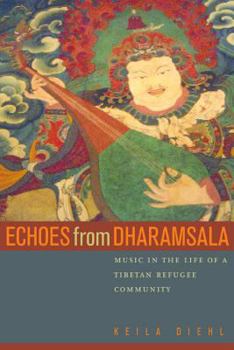Echoes from Dharamsala: Music in the Life of a Tibetan Refugee Community
Select Format
Select Condition 
Book Overview
In Echoes from Dharamsala, Keila Diehl uses music to understand the experiences of Tibetans living in Dharamsala, a town in the Indian Himalayas that for more than forty years has been home to Tibet's government-in-exile. The Dalai Lama's presence lends Dharamsala's Tibetans a feeling of being "in place," but at the same time they have physically and psychologically constructed Dharamsala as "not Tibet," as a temporary resting place to which many are unable or unwilling to become attached. Not surprisingly, this community struggles with notions of home, displacement, ethnic identity, and assimilation. Diehl's ethnography explores the contradictory realities of cultural homogenization, hybridity, and concern about ethnic purity as they are negotiated in the everyday lives of individuals. In this way, she complicates explanations of culture change provided by the popular idea of "global flow."
Diehl's accessible, absorbing narrative argues that the exiles' focus on cultural preservation, while crucial, has contributed to the development of essentialist ideas of what is truly "Tibetan." As a result, "foreign" or "modern" practices that have gained deep relevance for Tibetan refugees have been devalued. Diehl scrutinizes this tension in her discussion of the refugees' enthusiasm for songs from blockbuster Hindi films, the popularity of Western rock and roll among Tibetan youth, and the emergence of a new genre of modern Tibetan music. Diehl's insight into the soundscape of Dharamsala is enriched by her own experiences as the keyboard player for a Tibetan refugee rock group called the Yak Band. Her groundbreaking study reveals the importance of music as a site where official and personal, old and new representations of Tibetan culture meet and where different notions of "Tibetan-ness" are being imagined, performed, and debated.
Diehl's accessible, absorbing narrative argues that the exiles' focus on cultural preservation, while crucial, has contributed to the development of essentialist ideas of what is truly "Tibetan." As a result, "foreign" or "modern" practices that have gained deep relevance for Tibetan refugees have been devalued. Diehl scrutinizes this tension in her discussion of the refugees' enthusiasm for songs from blockbuster Hindi films, the popularity of Western rock and roll among Tibetan youth, and the emergence of a new genre of modern Tibetan music. Diehl's insight into the soundscape of Dharamsala is enriched by her own experiences as the keyboard player for a Tibetan refugee rock group called the Yak Band. Her groundbreaking study reveals the importance of music as a site where official and personal, old and new representations of Tibetan culture meet and where different notions of "Tibetan-ness" are being imagined, performed, and debated.
Format:Paperback
Language:English
ISBN:0520230442
ISBN13:9780520230446
Release Date:June 2002
Publisher:Perseus - Ucal Pod
Length:337 Pages
Weight:1.06 lbs.
Dimensions:0.8" x 6.1" x 9.1"
Customer Reviews
2 ratings
Music as Organism
Published by Thriftbooks.com User , 17 years ago
Nearly the world over, with perhaps the exception of Western classical artists, music is not regarded as a suitable profession by the majority of a society, yet it fulfills a profound, even integral, need of an individual and is at the center of a culture. This extraordinarily good book discusses how music becomes a contentious political and social force within a people living in exile. Influenced, pulled and tugged by Chinese musical forms within Tibet, Hindstani pop and Bollywood film songs, American rock, rap, and blues, and offical traditional tunes and instruments, Tibetan popular music (as opposed to Buddhist ritual music) is continually changing and is a source of pride and worry as it rapidly evolves. Keila Diehl's sociological and anthropological examination within ethnomusicology provides important insights on music as a living, interacting force. Her writing is smooth, without much scholarly argot. Her story as observer, participant, and analytical scholar is a good read. I enjoyed this book, particuarly having listened to many popular Tibetan recordings, and urge readers to also take this literary journey to Dharamsala.
Great Reading!
Published by Thriftbooks.com User , 23 years ago
This is a wonderful book about modern life in Dharamsala, exile home of the Dalai Lama in India. Dr. Diehl, an anthropologist, actually became a member of a local rock and roll band, the Yak band. Her story is about the day-to-day struggles of Tibetans to maintain their sense of identity while adjusting to the modernizing forces of global culture. The book is well-written and produced, with lots of sharp photos that give the reader a clear view of what life is like in the 'capital' of the Tibetan world in exile. Refreshingly, there is little anthropological jargon in this substantial and important book. I highly recommend it.





